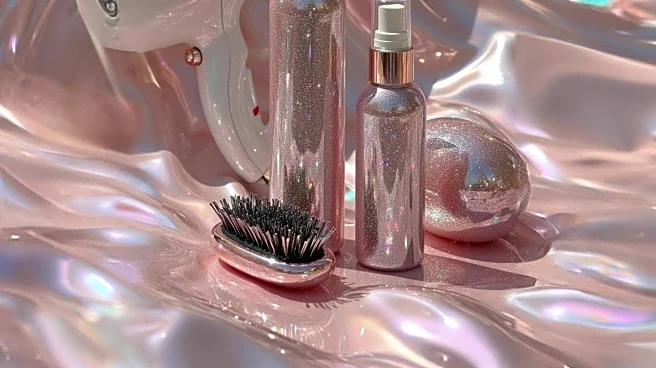What's Happening?
The hair care industry is undergoing a significant transformation, evolving from basic grooming to a holistic wellness experience that emphasizes emotional well-being and self-care. This shift is driven by consumer demand for products that offer both efficacy and sensoriality, akin to skincare routines. The market is projected to exceed $104 billion globally by 2026, fueled by innovations in hair growth solutions, playful branding, and immersive retail experiences. Key trends include the 'skinification' of hair care, where products highlight ingredient efficacy and clinical benefits, and the rise of waterless hair care formats that cater to sustainability and convenience. The industry is also seeing a surge in popularity for unconventional ingredients like onion shampoo, driven by social media trends.
Why It's Important?
This evolution in the hair care industry reflects broader consumer trends towards self-care and emotional wellness. As consumers increasingly view hair care as an investment in their mental and physical health, brands that successfully combine efficacy with emotional uplift are poised for significant growth. The industry's expansion into high-innovation segments like scalp care and hair growth presents new revenue opportunities, particularly in the prestige beauty market. Retailers and brands must adapt to these changes by emphasizing 'hair wellness' and 'scalp health' categories, potentially reshaping the beauty industry's landscape. This shift also highlights the growing importance of sustainability, as waterless formats become a standard expectation.
What's Next?
The hair care industry is expected to continue integrating with the wellness sector, focusing on longevity and biohacking. Future innovations may include smart scalp diagnostics and sensory-optimized packaging, enhancing the consumer experience. Brand partnerships with lifestyle companies could further capitalize on the 'power of play' trend, offering limited-edition products and immersive experiences. As sustainability becomes mainstream, waterless hair care formats will likely become a standard offering. The industry's focus on emotional and physical wellness suggests a continued emphasis on creating structured self-care routines that provide moments of calm and focus.
Beyond the Headlines
The transformation of hair care into a wellness-centric industry underscores a cultural shift towards prioritizing mental health and self-care. This trend reflects a broader societal movement towards holistic health practices, where beauty routines are seen as essential components of overall well-being. The industry's embrace of unconventional ingredients and playful branding also highlights the role of social media in shaping consumer preferences and driving demand for innovative products. As consumers seek authenticity and community support, brands that foster genuine connections and offer credible solutions are likely to thrive.









